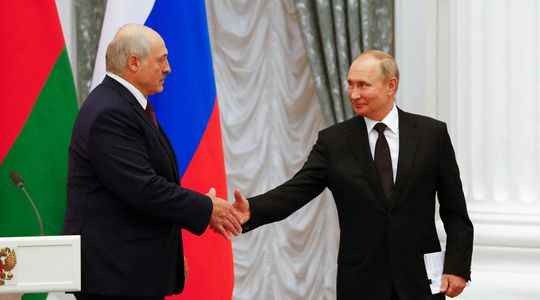On his birthday, October 7, Vladimir Putin received a somewhat special gift: a Belarusian tractor “with seeder”. The offer may seem incongruous. The object is nonetheless an object of national pride for Alexander Lukashenko, who has ruled Belarus with an iron fist for twenty-eight years.
Behind this apparent friendship, the Belarusian President’s relationship with Vladimir Putin has always been complex, while economic, political and military ties are almost vital for the country. Since the invasion in Ukraine, Alexander Lukashenko has been walking on a thread, he who, before the war, was trying to maintain a fragile position as “arbiter” between kyiv and Moscow. On February 24, the mask fell, as Russian tanks rolled into northern Ukraine through Belarusian territory. It is from there, too, that the Russian army launched part of the Iranian Shahed-136 kamikaze missiles and drones which fell on Ukrainian civilian infrastructure on October 10.
In parallel with this deluge of fire, which left 19 dead and 105 injured, Alexander Lukashenko announced on Monday October 10 the deployment of a joint Russian-Belarusian military group, raising fears of a new incursion along the border with Ukraine. , 1000 kilometers long. In belligerent rhetoric of his own, the President of Belarus said he had ordered Volodymyr Zelensky not to touch with “his dirty paws even one meter of Belarusian territory” and even accused the Poland, Lithuania and Ukraine to prepare “terrorist” attacks and an “uprising” in his country, with the help of Belarusian exiles forced to flee after his disputed 2020 re-election.
A way to keep the pressure on kyiv
For the moment, it is difficult to know what this “regional grouping of the Russian Federation and the Republic of Belarus” could consist of, according to military experts. In reality, this force already exists! Created in 1998, it includes the Belarusian army and elements of the Russian airborne and ground forces. “Nothing new, it’s a group that was already taking part in joint exercises before the war, explains Konrad Muzyka, director of the think tank Rochan. He was not involved in the fighting, but was nonetheless close to the border. Operationally, it is subordinate to the Russian command.” For this independent military expert based in Poland, this group mainly includes poorly trained and under-equipped Belarusian soldiers. On the Russian side, some soldiers, killed or wounded in Ukraine, should be replaced by new conscripts. Belarus would also need to mobilize 20,000 men to reach the required strength in wartime. According to several military experts, Monday’s announcement is above all a means of maintaining pressure on kyiv’s forces, withholding troops in the north that could be used in the counter-offensive in the east and south. The Ukrainian general staff indicated that it had not observed any indications suggesting that Russian or Belarusian forces were preparing for a new offensive from Belarus.
“Belarusians don’t understand this war”
Be that as it may, engaging Belarusian soldiers on Ukrainian territory would be a costly and unprecedented decision for Minsk, while part of society advocates “non-engagement” in the absence of “neutrality”, which was inscribed in the Constitution until it was amended on February 27. But Lukashenko’s room for maneuver is reduced, after the abortive revolution of 2020 which he only put down with the financial and police assistance of Russia. Nearly 35,000 people have been arrested, many opponents have taken the road to exile, some of whom find themselves in the ranks of the Ukrainian army. “Since the beginning of the war, we have observed in the Belarusian population an attitude either neutral or negative in relation to the conflict”, explains researcher Yulia Shukan, based on independent polls. “Belarusians do not understand this war and Lukashenko’s threatening speech does not catch on in society. Few people believe this narrative constructed by the regime.” Because the state media have less influence than among their Russian neighbors. In 2020, only 11% of Belarusians watched official media. Public opinion remains focused on daily life in the face of a relatively invisible “special military operation”, save for troop movements on Belarusian soil and Russian soldiers being treated in hospitals around the country.
“Difficult, under these conditions, to declare a partial mobilization, as in Russia,” said Yulia Shukan, for whom “Lukashenko’s room for maneuver against Moscow remains the great unknown since the start of the war”. On the one hand, the Belarusian president was visiting Abkhazia, a secessionist republic from Georgia, at the end of September. For years, he has been resisting pressure from Moscow to recognize this entity separated from Georgia in 1993, at the end of a war that left 10,000 dead. But was this visit the premise for a future recognition of this region, to give guarantees to Moscow? On the other, Minsk has still not recognized the “referendums” for the annexation of the occupied territories of Zaporijia, Kherson, Luhansk and Donetsk, which were held under Russian arms on September 28.
